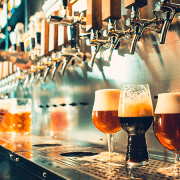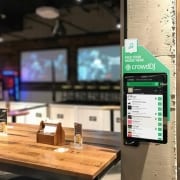FIVE FOOD & HOSPITALITY TRENDS FOR A POST-LOCKDOWN WORLD
For many it has been a tremendously difficult period, however we are starting to emerge from the lockdown period, and tentatively look towards the future.
Of the micro-trends that have risen in the last 3 months, which ones are likely to remain with us?
1. Hygiene awareness
The top trend that is likely to stick as the lockdown eases is our awareness of hygiene. Whether that is at a superficial level such as the visible actions of servers and chefs or the deeper themes of HACCP protocols and property maintenance.
Customers in restaurants, cafes and fast-food venues will be very sensitive to health and hygiene and as such, they will translate messy to unhygienic. Owners & staff must ensure that the physical presentation of their stores & venues, uniforms and personal appearance are maintained at optimum levels throughout all periods of the day to issue the vote of confidence that customers need to walk in through the front door and spend.
2. Innovation & Creativity
Not since 2008’s GFC have we seen such a squeeze on the hospitality industry. Back then, low levels of consumer confidence, required the industry to get creative; and it did. A new generation of entrepreneurs and restaurant empires sprang up to fill the hole left by outdated business models and old ways of running a restaurant.
2020 has been no different, even small single outlet operators have changed their business models completely in order to remain viable. Whilst these are born of necessity, it is unlikely that operators are likely to forget the lessons such as agility and flexibility as we move into the future phases of a post-lockdown era.
When business is easy, it is easy for operators to become complacent and look to others for new ideas and promotions. But as the squeeze is put on, it is inevitable that the cream will rise to the top. Great for customers and great for business!
(As a side note, in 2007/8 when the GFC hit, smartphones were still in the Genesis phase! …which brings me to my next point, Tech…)
3. Harnessing Technology
One of the success stories of many F&B operations (through the lockdown period,) has been their ability to leverage technology to remain connected to their audiences and customers and to pivot their brands around their dynamically changing needs. Messaging through social media, became an essential component of daily business. But the pandemic has also provided catalytic effect to many parts of the industry, will we see a rise in new solutions such as:
- Robots, from “on farm automation” to kitchen-to-table delivery, there has been a significant shift in the interest in robotics and applications in the industry. Some operators, such as Genki Sushi at KLCC Centre in Kuala Lumpur were already on this “train,” with orders taken via the restaurant website and orders delivered by train. All the condiments are provided for on arrival at the table. This low/no impact service offer is likely to become a far more prominent service approach in a post lockdown era.
- Virtual meetings & video conferencing became an everyday occurrence. Do I need to say more?
- Pick up only stores. I had the pleasure of listening to Nick Stone, CEO of Bluestone Lane speaking last week. Their brand pivoted from a fairly typical café model to that of an ordering portal (via their App) and pick-up from store with no contact or required in-store transactions. The innovation was launched in under a week when the lockdown came into effect in NYC. Coffee giant Starbuck’s launched its first “Starbucks Pickup” store in November 2019 with a similar model that provides for no in-store seating and with ordering done solely through its App portal.
- Airports all over the world are looking to technology for solutions to a myriad of issues and high-touch processes across the industry. Notably Pittsburgh Airport has commissioned the use of ultra-violet robots to eliminate viruses from the environment; Hong Kong Airport has instituted antimicrobial coating and autonomous cleaning robots; whilst Heathrow Airport has announced that they are driving the development of a Common International Standard by trialling processes that reduce the risk of spreading COVID-19. (Source: International Airport Review)
- Real time business reporting. Proactive and nimble F&B operations have significantly shifted their approach to daily business management and a much higher level of attention to the micro-financial aspect of their operations, allowing them to make decisions on the spot that keep them in business. Weekly cashflow evaluation, daily staff requirements, par levels and ordering can be achieved if the information is at hand and used in a positive and transformative manner. The benefits of this approach are unlikely to be left behind as we move into the Next-Normal.
4. Customer Communication
As we move from the lockdown, communication will become a significant factor of our customer service protocol. Hospitality has not had to comprehensively communicate the order of service, because customers intrinsically knew what was required of them or had prior experience. As food operators move to create a visibly safe environment, there will be a fundamental requirement to communicate new service processes and required customer etiquette.
In what is likely to become a well-used guideline over the coming months, the freely available “Black Sheep Restaurants; Covid-19 Playbook,” highlights that customers will have a role to play in the future of food operations. It is highly likely in the short-term that customers will need to provide F&B operators (particularly with a dine-in service) with a health declaration, contact details and a temperature check on arrival. The guide advocates that restaurants turn away diners that are not prepared to meet these requirements.
5. Local is good – buying locally, travelling locally!
Now is the time to start engaging with your local audiences. Corporate spending is unlikely to be a dominant source of restaurant spending for the remainder of the year, with many big businesses suffering from major disruption to their own industries.
With international (& interstate travel) off limits there has never been a better time to explore our own back yards. From shopping in the high street to holidays “out of town,” there has never been a better time to support each other and champion the local economy. Check out www.weeatlocal.com.au for more information, an Australian website dedicated to supporting local agriculture.
Source: https://futurefood.com.au/blog/2020/05/five-food-hospitality-trends-for-a-post-lockdown-world
Future Food is working with small and large food and hospitality businesses across Australia during these challenging times and is dedicated to finding the silver lining for all our clients, remaining positive and adapting best practice solutions to each F&B business to prepare for the ‘next normal’ hospitality trading environment.
To contact FutureFood click here >>>> https://futurefood.com.au/contact














